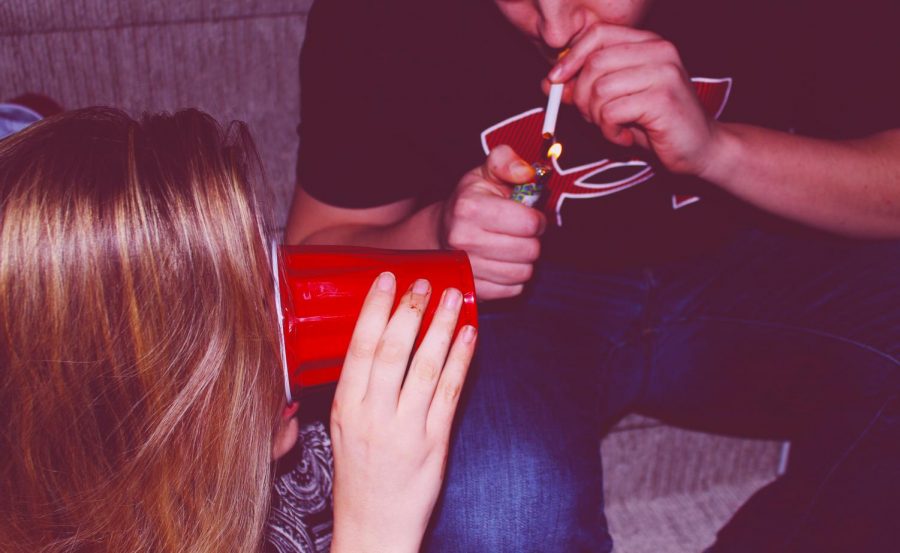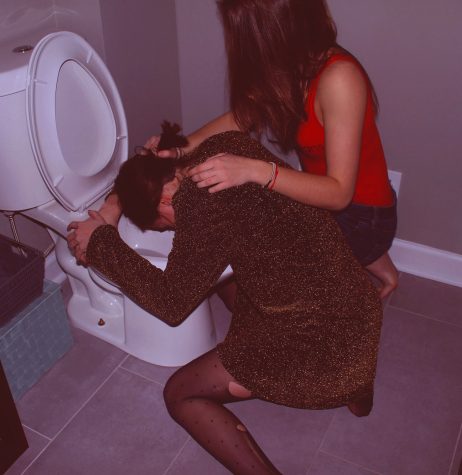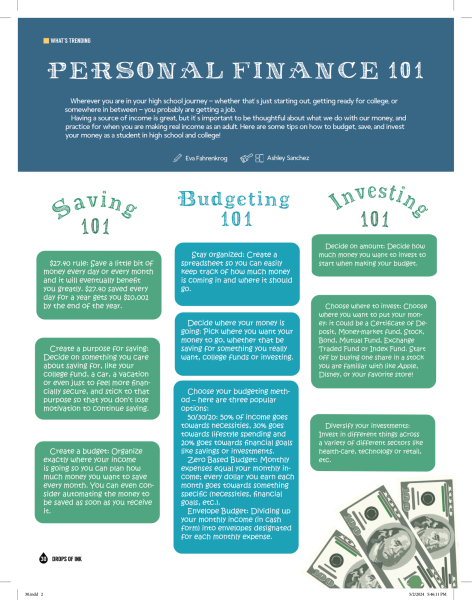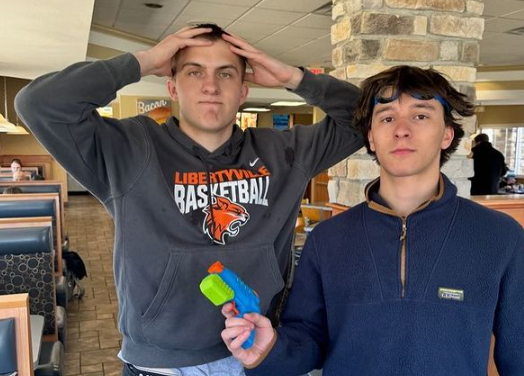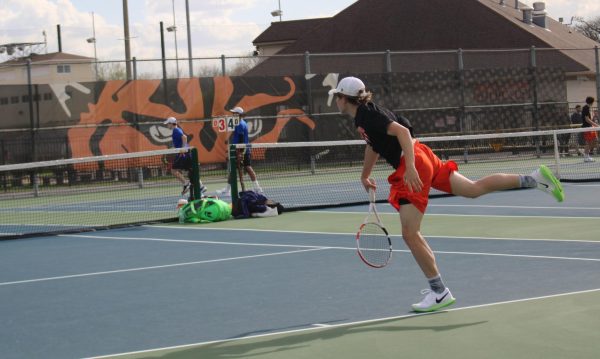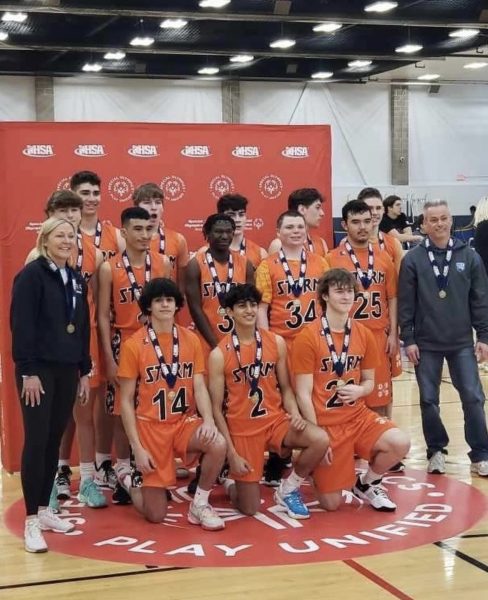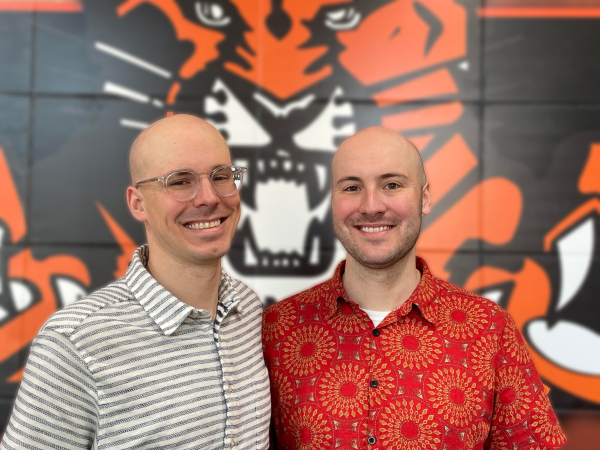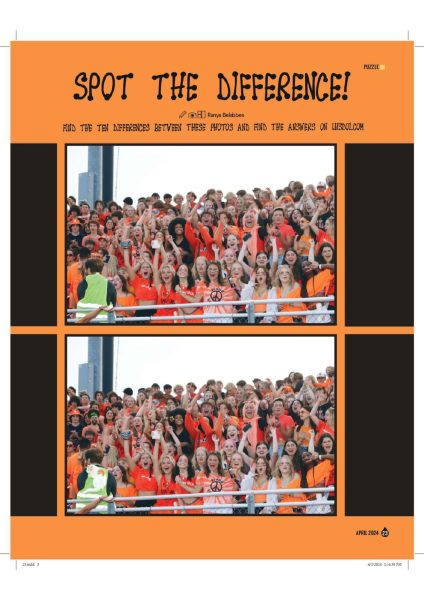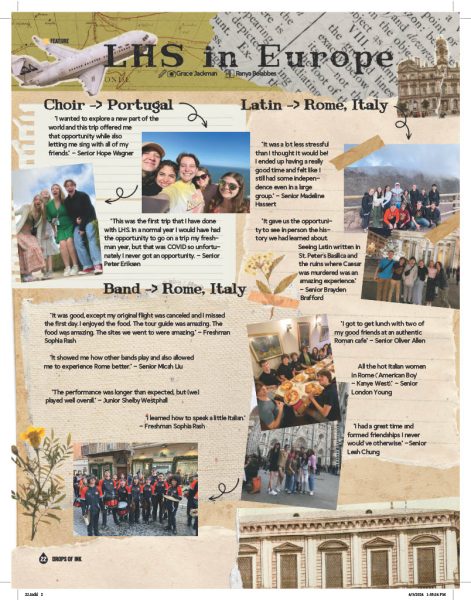The life of the party
According to the Center for Disease Control and Prevention, 11% of all the alcohol consumed in the United States is drank by people under the legal age of 21.
No matter the time of year or city that you’re in, high school parties occur. Even in Libertyville, the reputation of the high school party culture has developed, reaching to different houses and basements within the community. While not all students at LHS party, there is still a significant portion of those who do, which can alter the reputation of what it means to party, and illustrates the vast change in the modern high school social life.
Sex, Drugs and Alcohol
As Daniel, a junior, explained, there’s a casual atmosphere when walking into a party. Most people are there to socialize and meet other people from around the area. When he enters a party, which is ordinarily in the basement of a loud and crowded house, Daniel joins his friends as they smoke weed and drink.
“You just walk [into a party] and there’s a bunch of people talking, having fun, [messing] around. There’s always some music blasting,” Daniel explained. “It’s basically just people talking and just drinking alcohol.”
Daniel and others interviewed noted how high school parties are often stereotypical. According to Zoey, a senior, the parties that occur in her basement look quite similar to the parties portrayed in the media; despite the large crowds that attend, she enjoys hosting parties to meet classmates and hang out.
“I host parties because I like to have fun and I have a big enough space that I can have a bunch of people over… I love [partying]. I like to hang out with a bunch of my friends. I get to have a bunch of different people come together, and just chill together,” Zoey said.
Alcohol, marijuana and nicotine (often smoked through juuls or vape pens) are extremely common substances to see at a party, according to those interviewed. However, Brian, a senior, noted that the substance usage ranges at parties, as do the people themselves.
“There’s alcohol, there’s drugs, like weed, LSD, coke or something. It’s usually just weed and alcohol, and some [nicotine]. [The people] can range from 80 to 100 people, to a smaller group, just like seven people, like a small group of friends,” Brian described.
Some of the students interviewed noted that the age range of students that party is quite large, and not limited to upperclassmen. Zoey explained that while she has never seen a freshman at a party, she has seen students from the sophomore class but said those individuals don’t alter the atmosphere of the party.
Students interviewed explained how the illegal substances, such as alcohol and drugs, are actually brought to the parties: it’s rare that the hosts supply the parties themselves.
“Some people have older siblings who get [alcohol and drugs] for them. Other people have friends who are older who can get it for them,” Zoey noted. She further explained that the substances are normally snuck in through water bottles filled with vodka or bottles hidden inside of bags.
Looking beyond the actual substances present at parties, there are many reasons that teenagers partake in drinking and using drugs — and the students interviewed emphasized that they do it because they genuinely enjoy the feeling.
“I like to drink and smoke [weed]. It’s like a cure for boredom, honestly… Being high is just like you’re mellowed out, and music sounds good and everything’s really funny,” Daniel described. “When you’re drunk, you just kind of feel warm and fuzzy and you’re kind of tipsy. It’s kind of like [my] nerves are lessened when [I] drink. [I’m] less nervous about everything.”
Daniel further explained that because he enjoys the feeling of being high and drunk, it makes partying appealing to him. And Daniel isn’t the only one who feels this way; others voiced similar reasons as to why they enjoy drinking at parties.
“I like drinking alcohol because, although I am decently extroverted, I would consider myself an extroverted introvert, and just having that alcohol and that substance helps me relax,” Brian explained. “[When I’m] relaxed in that [party] setting, it’s nice for me because there are a lot of people in that [party] setting that I normally wouldn’t have interacted with otherwise, had it not been for the traditional high school party.”
As the students interviewed described, drugs and alcohol are commonly out in the open at parties, but sex is more private in a party setting. Hooking up does occur at parties, but some students noted that public sexual interaction is mostly just teenagers making out.
Daniel emphasized that drinking is far more common than sex.
“There is definitely more drinking. Everyone is not having sex left and right. There are some people having sex, but you don’t even know, you know?” Daniel explained. “Everybody is drinking out in the open… people aren’t like [having sex] right on the couch in the middle of a party. People are more low-key.”
While teenagers often attend and enjoy parties because of the alcohol and drugs that are available, the high school party atmosphere is not pleasant to everyone. Jessica, a junior, expressed that she no longer enjoys partying in large settings.
“[At parties], there are just a lot of people involved. The chances are, at a party, [people are] not going to go home and tell their parents and tattle. But [not attending] is just safer, and I just don’t really like the loudness and craziness of it,” Jessica explained.
Jessica further stated that sometimes, parties do become out-of-hand and a dangerous consequence is blackout drinking. Blackout drinking is commonly recognized as when an individual falls unconscious due to excessive drinking or drug usage, which is occasionally seen at parties. The students interviewed expressed how it’s stressful to see individuals black out.
“I’ve seen [people black out]. It’s a little scary because people are just dumb,” Daniel stated. “When someone is too drunk, it’s like an issue because they’re just limp on the ground, like they’re dead weight. They’re just throwing up everywhere.”
Jessica has lived through it and expressed how horrible it felt.
“I was blacked out [drunk] before. One time I got very, very drunk. I couldn’t really control myself. It was kind of like I was just a puppet. I don’t remember parts of the night and that’s so [crazy] to say, but I don’t. It wasn’t the last time I drank but it should’ve been. It was the worst night of my life, honestly,” Jessica said. She later explained that these dangerous experiences contribute to the reason Jessica no longer enjoys the typical high school party atmosphere.
All of the students interviewed expressed some worry about another dangerous aspect of attending parties: the police. Due to the noise as well as the large crowds at parties, the police are occasionally dispatched to shut down parties, which can lead to teenagers getting caught with drugs and alcohol. However, the majority of the students interviewed agreed that their love for partying outweighs the potential negatives for them. Brian further concluded that partying has positively impacted his life because of the ability to meet others.
“I’ve definitely made more friends through partying. I’ve met a lot of people at parties,” Brian explained. “Like the traditional jocks, or popular people, I’ve become a lot better friends with a lot of them, and I don’t think [we] would’ve become nearly as close had I not been at those parties.”
Potential Pressure
Those interviewed noted how the elementary school lessons of peer pressure differ greatly from the peer pressure in real life, particularly in high school. However, they all agreed that public peer pressure is not common at parties, and people don’t often interfere with others’ personal choices.
“I feel like people don’t really pressure those not drinking into drinking because they realize they actually have a genuine reason [to not drink]. Even if the reason is [someone] doesn’t want to [drink] that night, people don’t care that much,” Brian explained.
Daniel noted that depending on the people, peer pressure is different. He also noted that despite the fact he doesn’t feel pressured, that may not always be the case for other teenagers.
“I don’t know if I’ve seen people get pressured. It’s tough because usually if people are smoking, then they came to smoke some weed. You’d never know,” Daniel admitted. “There’s a line between pressure and wanting to because everyone else is. It’s tough to say.”
Nevertheless, the students noted that pressure varies, and it is sometimes internal pressure, as the feeling of belonging is often something teenagers desire.
“There’s kind of a sense of being left out, but it’s not like I have to drink, it’s like I want to be a part of [the party],” Zoey specified. “I don’t want to be the sober person who’s not having fun. I want to be the person who is having fun with all of their friends. Being sober in a group of drunk kids is horrendous.”
Mr. Matthew Wahl, a sociology teacher at LHS, explained that the large groups of teenagers that enjoy the party culture are not always motivated by teenage conformity, but rather, are influenced by pop culture’s normalization of partying for teenagers.
“[Partying] becomes a cultural norm. It’s not taboo anymore, with party culture… [Partying] is just what kids do. I think the popular culture kind of glorifies it in a way,” he explained.
As Mr. Wahl and the students interviewed noted, the meaning of partying today is quite different for the current generation of teenagers than how it used to be. A culture develops through partying and then alters the social interactions among teenagers.
“[Partying] can go both ways, in my case, because [while partying], I was being stupid and trying things out with people that [didn’t want] that, and I should’ve respected that more. But also, [on the other hand], I’ve met so many down-to-earth people that I’m friendly with right now,” Jessica said.
The students explained that partying has given them positive and negative experiences throughout high school, especially since each party is quite different. They concluded that, through partying, they personally have found their own social lives that they enjoy — all contributing to the reputation of the modern day party.
Editors’ Note: Although the topics of underage drinking, drug use, and partying are mentioned in this article, Drops of Ink does not condone or promote the behavior discussed here, given that, for all students, such activities are illegal, with the exception of some 18-year-olds who smoke cigarettes. Drops of Ink would like to note that these photos are all staged for the purposes of this article. We as a staff believe that it is our duty to report on events and experiences that occur in high school and are aware that while not every student engages in these acts, there are some who do, making this a relevant and worthy topic to discuss. If anyone is negatively affected by this article, we encourage you to seek help from your counselors and/or LST. For the purpose of this article and its discussion of illegal actions, all underage individuals interviewed are quoted anonymously, aside from their grade and gender. They are identified with fake names, for the protection of their privacy, due to their statements made within the article.
Editor-in-Chief Maria Thames contributed to the reporting of this story.



